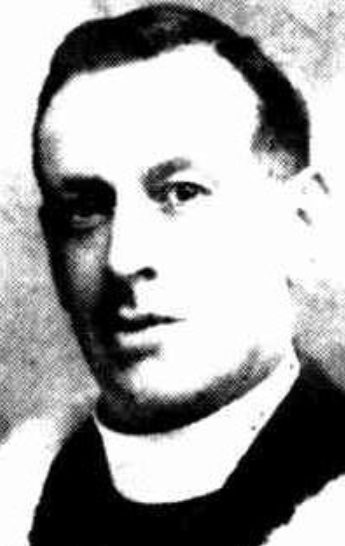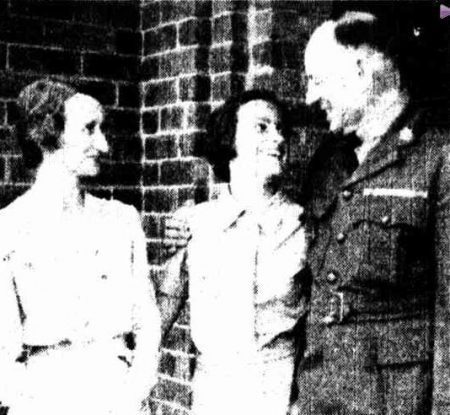The call for a “padre” rang out down the line. Some poor “digger” (the colloquial term for an Australian soldier) had died and a chaplain was needed for the burial service.
Joseph John Booth answered the call and made his way to the forward point on the line, his heart surely pounding in his chest. It was only his second evening on the front, a place where death was as common as life.
The year was 1917, and millions of young men from around the world were dying in the trenches of the Western Front. We would eventually call this awful cycle of death and destruction World War 1.
As Joseph arrived in the trench to give his first burial service, he trembled with the knowledge that German soldiers were merely 60 feet away in their own trenches, likely listening to every word he spoke. In the darkness, he could not read from his prayer book and was forced to do as much of the service as he could from memory. This would only be the first of countless funerals he would lead during the war.
Joseph’s Story

I started learning about Joseph’s story out of a personal interest in World War 1 history. Anzac Day—a special annual tradition for Australians and New Zealanders to remember and appreciate the sacrifice of servicemen and women in the military—was just around the corner, and I found myself in the research room of the State Library Victoria, searching for stories about army chaplains who served during World War 1. It was here that I stumbled on Joseph’s personal letters to Beryl Bradshaw, the love of his life, that he wrote while serving in France.
Joseph was an orphan from England who moved to Australia in his early 20s, settling in the western Melbourne suburb of Footscray. In 1915, Joseph was ordained as an Anglican priest after studying theology at Ridley College. In the following year, he became engaged to Beryl and was also enlisted in the Australian Imperial Force as a “padre”—the affectionate term given to army chaplains by the enlisted men.
Joseph soon found himself on a troop ship heading to the battlefields of France, serving God and His people in a war half a world away. Was he caught up in the excitement of seeing the world, giving little thought to the terrors ahead? Or did he press forward even in the face of the death and destruction waiting ahead? How would his faith be tried in face of the worst war the world had ever seen?
Joseph’s Ministry
Soon after arriving in France, Joseph was attached to the 8th Battalion, a veteran unit and legendary for its role in the Gallipoli campaign, a series of battles in modern day Turkey early in the war that was fought mainly by soldiers from Australia and New Zealand. It was not an easy start to his ministry, since Joseph was a “novice among seasoned veterans,” as he told Beryl in one of his letters. However, he seemed optimistic, perhaps fueled with a zeal for his new ministry. He began leading the regular, mandatory church service, often called a “church parade”. He reported the first one as “a very fine Brigade parade and a fairly happy communion service, though I shall not be satisfied until my numbers increase”.
As time progressed, Joseph’s letters revealed that he became a well-respected man among the troops of his battalion. Perhaps he took to hear the advice given him by the Assistant Chaplain General on his arrival: “Never lower your standards, avoid being a Pharisee, avoid the whisky bottle, take on every job that you possibly can, and remember that, as a servant of Jesus Christ, your duty is to make others comfortable, even though you yourself may need the comfort more.”
Soldiers certainly saw and respected his courage and integrity. They witnessed his sacrifices, and through his display of character, many who did not have a relationship with Christ were drawn to the truth of the gospel. As a result, Joseph’s church services grew in number.
I am challenged to live my life the same way that Joseph served as a padre: to stand firm in the face of growing pressure to lower my standards, to avoid being caught up in following rules and regulations like the Pharisees of Jesus’ time, and to serve others even when it’s uncomfortable.
The Hardships of War
There was one time when the doctor’s resources were drained dangerously low due to the number of wounded, so Joseph and a few other men voluntarily braved artillery-bombarded territory to retrieve medical supplies. After they had found the dearly-needed supplies, a sudden, terrifying artillery barrage caused them to cower in a gully. While waiting for the barrage to pass, Joseph got a premonition “in his mind’s eye” that they would be directly hit by a salvo of shells. He convinced the men to keep moving, and mere moments after they left, multiple shells exploded in the gully behind them. Joseph wrote to Beryl that if they had stayed, they “would have been wiped out almost without doubt”. He knew that God had providentially protected them in this near-death experience. Joseph would later receive the Military Cross, one of the highest military honours, from the King of England himself.
Men were dying by the hundreds and thousands every day all along the Western Front, and the duty that caused Joseph the greatest angst was the burial services of those who had died in action. During one of the intense episodes of the Battle of Passchendaele, Joseph was required to oversee the mass burial of 60 men from his battalion.
When his battalion was finally given relief and pulled out of the front line, Joseph wrote this in a letter, “perhaps one of the most pathetic experiences after a big battle is to go round the lines and discover the old friends who will serve the Army no more. The memory of those two days will lie heavy upon me even as long as I live. War is unspeakable and these men with whom one serves are indeed the very salt of humankind.”
I have found that particularly on days like Anzac Day, our minds are drawn to the tragedy of war, the frailty of human life, and the condition of our souls. We search for the answers to why there is so much suffering, in times of war as well as in our relatively peaceful society today. In the purposelessness and tragedy of events like World War 1, where can we turn?
Daily, Joseph and the men he served faced this trauma. And yet through it all, his faith remained firm. How can that be? The only answer that I can find is in the hope of the truth of the Gospel. That despite the evil and destruction we see around us, there is a loving God who is yearning for us to be in relationship with Him, to accept the love that He is freely giving, and to live the life He intended us to live, whatever our circumstances.

After the war, he married his sweetheart, Beryl, and served as vicar at St. Pauls in Fairfield, Melbourne. He would be remembered as a vicar who had a sympathetic understanding of people, as well as a remarkable memory for names and faces.
Joseph later made a collection of his letters, the same ones that I would find in the State Library many decades later. The postscript he wrote to this collection has stuck with me, “I hope those of you who read them [the letters] will find some little pleasure and gain some information, for future generations must surely learn that war is a filthy business, only lightened by the amazing courage and the wonderful comradeship of men of every race. The war is long over. It was to have ended war. Though it may not, it has begun a movement toward peace which, please God, will never die.”
As I reflect on a war that ended a century ago, I pray that I would be dedicated to sharing the peace that can only come through Jesus, just as Joseph John Booth did with his life.
Caleb Young was born in New Zealand, raised in the Fiji Islands and is a passionate storyteller. He previously served on the team of Our Daily Bread Ministries in Melbourne. This article was adapted with permission from YMI, a ministry of Our Daily Bread Ministries.
Photos courtesy of ww1anzac.com

